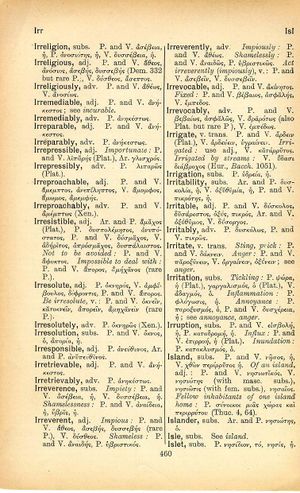irritate: Difference between revisions
From LSJ
Sunt verba voces quibus hunc lenire dolorem possis, magnam morbi deponere partem → Words will avail the wretched mind to ease and much abate the dismal black disease.
m (Text replacement - "(|thumb)\n(\|link=)" to "$1$2") |
m (Woodhouse1 replacement) |
||
| Line 1: | Line 1: | ||
{{Woodhouse1 | {{Woodhouse1 | ||
|Text=[[File:woodhouse_460.jpg|thumb|link={{filepath:woodhouse_460.jpg}}]] | |Text=[[File:woodhouse_460.jpg|thumb|link={{filepath:woodhouse_460.jpg}}]] | ||
===verb transitive=== | |||
[[sting]], [[prick]]: [[prose|P.]] and [[verse|V.]] [[δάκνειν]]. | |||
[[anger]]: [[prose|P.]] and [[verse|V.]] [[παροξύνειν]], [[verse|V.]] [[ὀργαίνειν]], [[ὀξύνειν]]; see [[anger]]. | |||
}} | }} | ||
{{Lewis | {{Lewis | ||
Revision as of 09:08, 20 May 2020
English > Greek (Woodhouse)
verb transitive
sting, prick: P. and V. δάκνειν.
anger: P. and V. παροξύνειν, V. ὀργαίνειν, ὀξύνειν; see anger.
Latin > English (Lewis & Short)
irrītātē: adv., v. 1. irrito,
I P. a. fin.
Latin > French (Gaffiot 2016)
irrītātē, en excitant la colère || -tius Amm. 22, 15, 19.

